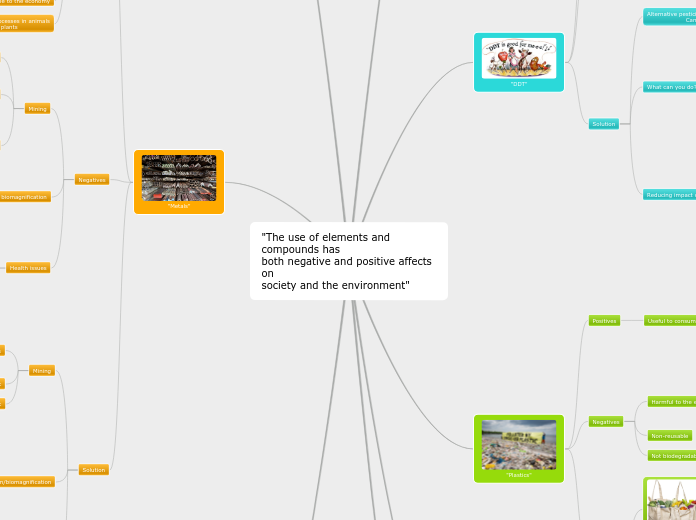a Sydney Waddell 4 éve
355
"The use of elements and compounds has both negative and positive affects on society and the environment'

a Sydney Waddell 4 éve
355

Még több ilyen
Planting small plants to help filter water
Bushes
Grasses
Shrubs
Trees
Phosphorus
Nitrogen
Living organisms die
Eutrophication
Limit industries use of toxic substances/metals
Mercury
Avoiding use of PVC
Can cause lead build up in water
Disposing both household chemicals/oils properly
Clean areas that have been exposed to metals
Limit the use of heavy metals
Eco-friendly equipment
Replanting/replenishing the environment
Alternative energy sources
To much iron in your blood
Sever damage to the heart
High exposure can damage organs
Lungs
Kidney
Brain
In animals organs
Liver
Kidneys
Climate change
Waste
Toxic chemical
Can easily leak into the soil and water
Cyanide
Toxic to both humans and animals
Disrupts ecosystem/environment
Retain heat
Prosthetics
X-Rays
Smoke detectors
Phones
Vehicles
Aluminum
Gold
Lead
Tungsten
Titanium
This will help get rid of fluoride in your water
Fragile bones
Poor brain development in children
Giving back to the environment
Replanting trees, grass, bushes
Sustainable equipment
Waste management
Pumping ground water and diverting surface water
Use alternative energy sources
Solar power
Wind power
Produces waste
Causes pollution
Draining lakes
$1.5 billion
Replace asphalt
Heating pipes in the road
When large amounts of road salt gets dumped on the roads
Causes harm to animals
Fills up landfills
Straws
Toys
Water bottles
Containers
Grocery bags
IPM Method
Prevention
Control
Monitoring/identifying pests
Never apply pesticides when its raining/going to rain
Plant buffer strips
Find out which foods have a higher amount of pesticides
Grow your own produce
Wash your produce
Buy organically grown foods
Ferric sodium
Ammonium soap and fatty acids
In the fatty tissues of animals
Amount of chemicals increases at each trophic level
Seals
Polar bears
Technologies that destroy pollutants
Rotary concentrators
Rotate at a high speed to separate pollution into hydrophobic media where it is then destroyed by an oxidizer.
Regenerative thermal oxidizers
Repurpose industrial heat to destroy pollutants
Catalytic oxidizers
Uses high temperatures to change air pollutants into there constituent compound form before the chemical can be released into the environment.
Clean energy sources
Solar energy
Wind energy
Cancer
For those that live near factories
Higher rates of heart disease
Benzene
Chloromethane
Carbon disulfide
In animals
on food products
From factories
Hygiene products
Plastics
Clothes